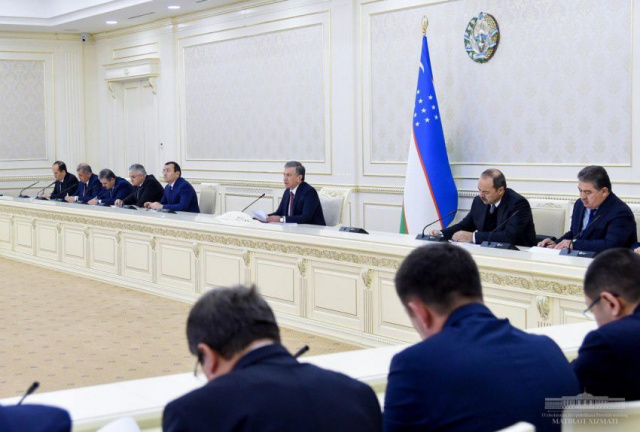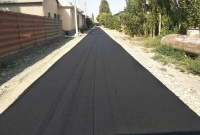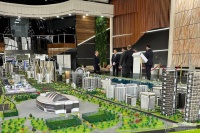Measures identified for implementation of a new housing construction system

On November 22, a meeting was held under the chairmanship of the President of the Republic of Uzbekistan Shavkat Mirziyoyev to discuss measures for introducing a new system of providing the population of cities and villages with housing.
In order to provide decent housing over the past three years, 104 thousand units of affordable housing have been built, including 63 thousand in villages and 41 thousand in cities.
Despite this, the pace of housing construction is not keeping pace with the growing demand of the population. This is evidenced by more than 36 thousand appeals regarding the housing issue received by the People's Reception Office for 9 months of this year.
Many are unhappy with the quality of houses. Some areas erected in villages are not connected to engineering and communication networks. There is unrealized housing, and for some houses, repayment of loans is problematic.
The reason for these and other shortcomings is that the construction of affordable housing does not have a stable financial source and is carried out mainly at the expense of budgetary funds. Competition in the system is weakly formed, private sector participation is not enough.
According to the calculations of international organizations, to fully satisfy the housing needs of the population, it is necessary to build 145 thousand apartments annually. It takes almost 30 trillion soums a year.
Starting next year, a new system for providing the population with housing will be operating. From now on, the construction of houses will be carried out not by the state, but by the private sector. The state will support the demand for housing through the provision of mortgage loans to the population under optimal conditions. The amount of resources for mortgage lending will no longer be limited by the banking and regional principles.
Following the local discussion of this proposal, business developers responded positively to it. They noted that if the population's access to loans is simplified, the possibilities for housing construction will expand while maintaining the current price level, but with higher quality.
Based on this, henceforth, the construction of houses in cities will be carried out in the following order.
First, business entities, at the expense of their own and external funds, will build houses for 13 thousand 750 apartments in the capital and other cities. The issues of designing houses will also be addressed by entrepreneurs themselves.
Second, land for construction of houses will be allocated through auctions. Connection of houses to water supply and sewage networks, construction of access roads will be financed from the republican and local budgets.
Third, for healthy competition between banks, the Ministry of Finance will allocate almost 3 trillion soums to them through an auction for the subsequent allocation of mortgage loans.
In addition, a mortgage refinancing company will be organized with the assistance of the Asian Development Bank. It will place funds in banks as additional resources for the allocation of mortgage loans for new buildings.
Fourth, a completely new and, most importantly, targeted support system for low-income groups of the population will be introduced. Grants will be allocated from the budget to 10 thousand 800 urban families in need to cover the initial contribution and interest payments on the loan. These funds will be used to cover interest in terms of the credit rate exceeding 12 percent in the city of Tashkent and 10 percent in other regions.
At the meeting, heads of responsible ministries and organizations were instructed to select and put up for auction in accordance with the new procedure land plots for housing construction, to determine the average market value of housing for calculating the upper limit of loans.
Issues of reforming the housing construction system in villages, phased transfer of customer functions from the engineering company Qishloq Qurilish Invest to the private sector were also discussed.
It was noted that from now on, housing in the villages will be built not in a row building along the roads, but in the form of areas adjacent to cities and district centers. This will make it possible to turn the districts into large agglomerations in the future, which will reduce the burden on the infrastructure, increase the economic activity of the population, and allow more efficient use of land resources.
At the meeting, local leaders were given specific instructions regarding the allocation of land and loans for such areas, providing them with infrastructure, and supporting socially vulnerable people.
The President noted the need for eradicating manifestations of nepotism and other abuses in the process of paying subsidies for the initial contribution and interest on mortgages. It is necessary to ensure unquestionably the receipt of subsidies allocated from the budget by citizens of socially vulnerable categories.
Next year, about 1 trillion soums of subsidies will be allocated from the budget, thanks to these funds 16 thousand families should find help in acquiring housing in cities and villages.
The population will not have to visit several instances to collect the package of documents necessary to receive a subsidy. From now on, applications will be considered by standing commissions under the territorial departments of the Ministry of Economy and Industry, which will form a target list of low-income families.
The commissions will include representatives of banks, financial and tax services, labor bodies, the makhalla and other agencies. In addition, any citizen will have the opportunity to participate and express his opinion at the meetings of the commission, the issue of subsidies should be addressed in a wide public discussion.
The khokimiyats of the regions were indicated the need for identifying low-income families to purchase housing in 2020, to develop the procedure and criteria for the alternate payment of subsidies, the introduction of positive experience in their regions.
Next year, the engineering companies Uzshahar Qurilish Invest and Qishloq Qurilish Invest will continue to build 4,250 houses in cities and 8,000 houses in rural areas.
To prevent the downtime of already constructed houses, the financing system for urban construction will be improved. A list of those wishing to purchase housing will be formed, and financing for construction will not be given progress until the required amount of contributions has been collected.
Banks, having decided on buyers of housing in cities under construction according to the current system in 2020, will implement a system for financing construction through mortgage loans allocated to customers.
The President noted the need for widespread use of innovative building materials for reducing the cost of housing and improving its quality.
Local khokimiyats were instructed to complete the allocation of land for housing construction, the selection of contractors and to ensure the start of work by March 1, 2020.
"We are moving to a new system in housing policy. In this process, the head of each region is obliged to take responsibility and form his own experience in the housing sector. From now on, we will ask the khokims not about the number of houses built, but about how many entrepreneurs were attracted to the sphere, how much land was allocated to them, whether the infrastructure was created, what is the quality of housing and how many people were satisfied", the Head of the state said.
The Republican Commission for Construction and Sale of Housing was instructed to take control over the construction work on site.
The khokims were instructed to pay special attention to the construction of housing in areas freed from demolition of dilapidated buildings and structures, as well as the inadmissibility of demolition of real estate until compensation is paid to the owner and all his legal conditions are met.
It was noted that the head of the state body is responsible not only for his reputation, but also for the reputation of the department he heads, it is necessary to behave modestly, carefully and reasonably in dialogue with people and the media, make decisions guided by law.
Information of responsible persons was heard on the issues discussed and priority tasks for the future were identified.











